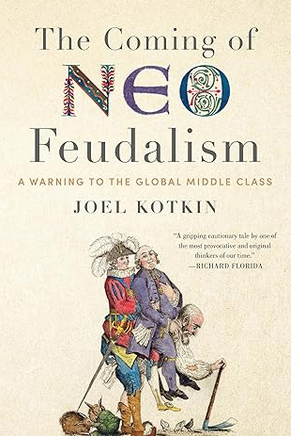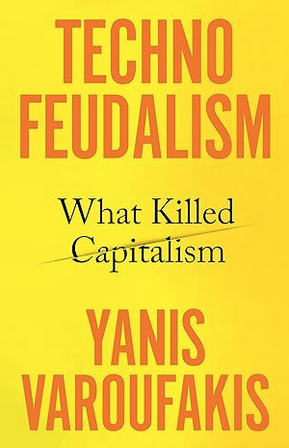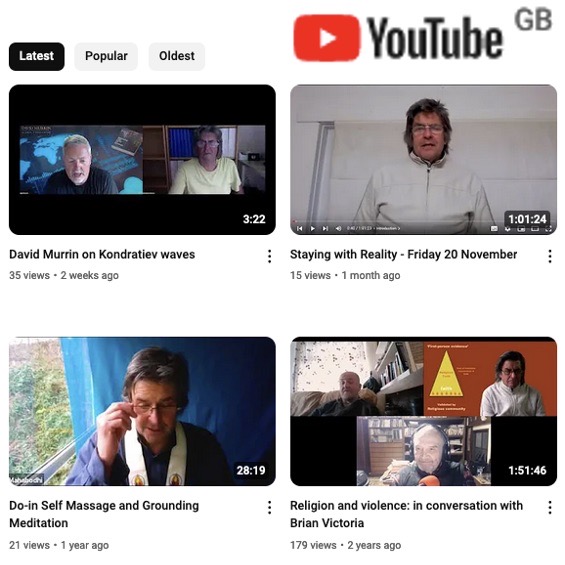Below is an excerpt from my forthcoming book…
© Mahabodhi Burton
7 minute read
Check out this fascinating 7-minute excerpt from the chapter ‘Transhumanism and Alienation,’ which delves into the contemporary challenges posed by the increasing influence of Silicon Valley, social media algorithms, and Artificial Intelligence in our daily lives. The excerpt examines the tragic social consequences of an alienated geekish mindset that often accompanies this technological landscape.
Are you concerned about the future of technology and its impact on society? This excerpt is a must-read.
New Feudalism
Governing elites in Britain in the nineteenth century: i.e., the middle-classes saw themselves as cultured and therefore as truly human: whilst they looked down upon the masses: the workers and peasants. In this regard, social commentators in recent years have come to speak of a new feudalism: a primary characteristic of which is that individuals’ public lives are increasingly governed by business corporations:[1]
‘Neo-feudalism or new feudalism is a theorized contemporary rebirth of policies of governance, economy, and public life, reminiscent of those which were present in many feudal societies. Such aspects include but are not limited to: Unequal rights and legal protections for common people and for nobility, dominance of societies by small and powerful elite groups of society, and relations of lordship and serfdom between the elite and the people. Often the former are rich and the latter poor.’[2]
Joel Kotkin outlines what he thinks will happen in his audio book The Coming of Neo-Feudalism: A Warning to the Global Middle Class:[3]
‘Following a remarkable epoch of greater dispersion of wealth and opportunity, we are inexorably returning towards a more feudal era marked by greater concentration of wealth and property, reduced upward mobility, demographic stagnation, and increased dogmatism. If the last 70 years saw a massive expansion of the middle-class, not only in America but in much of the developed world, today that class is declining and a new, more hierarchical society is emerging.
‘The new class structure resembles that of Medieval times. At the apex of the new order are two classes–a reborn clerical elite, the clerisy, which dominates the upper part of the professional ranks, universities, media, and culture, and a new aristocracy led by tech oligarchs with unprecedented wealth and growing control of information. These two classes correspond to the old French First and Second Estates.
‘Below these two classes lies what was once called the Third Estate. This includes the yeomanry, which is made up largely of small businesspeople, minor property owners, skilled workers, and private-sector oriented professionals. Ascendant for much of modern history, this class is in decline while those below them, the new Serfs, grow in numbers–a vast, expanding property-less population.’[4]
Joel Kotkin was interviewed by Andrew Keen for Literary Hub: [5]
Andrew Keen: ‘When you walk around San Francisco … you really are returning to a medieval tableau of enormous wealth, which is guarded and private; and then the streets (are) teeming with homeless people and hungry people and crazy people: it’s almost as if when you go to San Francisco it reminds you of the imagery of Bruegel, or some other mediaeval artist.’
Joel Kotkin: … ‘What scares me most of all if you have companies or entrepreneurs taking over the dissemination of news: deciding what you can see what you can’t see, which tend to reflect the bizarre Bay Area view of the world, which is very censorious progressivism. Everybody I know in our business is terrified that Google is going to knock you off; you’re not going to be in YouTube; you’re not going to be on Facebook. I have friends who have been basically taken off; there is no way that they are racist, but they disagree with the party line.’
Asked about a solution, Joel thinks that the Big Tech companies need to be broken up or turned into utilities:
Joel Kotkin: ‘So I think that a) we have to diminish the power of the oligarchs … I covered Silicon Valley in the 80s and what was wonderful about it is that it was very competitive: there was a time when there were forty, forty-five disk drive companies … now eventually there weren’t forty-five, but in that process, fortunes were made, technological improvement … One of the reasons why the software doesn’t get much better, is you have monopolies: Why does Google want to make their service better? I think in some ways their service is worse, because they’ve both politicized and commercialized their search results … In the old days, it was a very nice pure program, that’s why it did so well. We are seeing this over and over again: the tech-oligarchs seize a market, very often using the idea that they have so much capital that they can afford to lose money for years and years, wipe out everybody else, and then take control.
‘Second of all, (there) absolutely has to be a rejection of the cancel culture and the censorious nature of the university and the media … One of the scariest things … I don’t know if you read Bari Weiss’s recent letter,[6] or Andrew Sullivan. Now we are not talking about the Hitler youth here; we are talking about people who are fairly liberal … And in Andrew Sullivan’s case, basically a progressive himself[7] … unable to deal with the culture at Vox,[8] which is so censorious and so controlling.
.’.. then you have to change the economic priorities in this country; One thing is to re-shore more manufacturing from China. Moving all our production to China is a geopolitical and economic disaster, particularly for large parts of this country. Our education system: we are increasingly more interested in indoctrination than education … the knowledge level of the kids going to college is so bad now (Yes they probably are a little bit better at running power-points, I will give them that; and they sometimes use video well) … but how do you talk about feudalism to people who don’t know what feudalism was?’[9]
Techno-feudalism
There is also a version of neo-feudalism called techno-feudalism.
‘During the course of the years 2020-2021, Yanis Varoufakis has written and lectured much about his theory concerning neo-feudalism. He posits that traditional capitalism has evolved into a new feudal-like structure of economies and societies, which he refers to as ‘techno-feudalism.’ Varoufakis explains that unlike in capitalism, feudal economies have the quality of being dominated by very small groups of people and predetermine the behaviour of markets as they see fit. Taking the example of massive online enterprises such as Facebook, Amazon and others, Varoufakis noted that such venues are primarily governed by the whims of single individuals and small teams, and thus are not truly capitalist markets of free trade, but rather feudal markets of stringent control.’[10]
Radical political economist Michel Luc Bellemare has coined the term: techno-capitalist-feudalism (TCF for short). In his 2020 book, titled Techno-Capitalist-Feudalism, he says:
‘One of the primary characteristics of the age of techno-capitalist-feudalism would be the degeneration of the old modern class-system into a post-modern micro-caste-system, wherein an insurmountable divide and stratum now exists in and between the “1 percent” and the “99 percent”, or more specifically, the state-finance-corporate-aristocracy and the workforce /population.’
Techno-feudalism equals caste
It is interesting to me that Bellemare brings in the idea of a micro-caste-system. Talk to any Buddhist in India trying to navigate the caste system, as my teacher Sangharakshita relates:
‘In 1951 the Government of India held a census. These are held every 10 years, but this was the first census enumeration after India became independent. At that time I was living in Kalimpong, which is up near Sikkim, near Tibet. The census enumerator, who was a Bengali Brahmin–some Mukherjee or Chatterjee–came to see me with the form already filled in. He said, “Aha, yes, you are a Hindu, and your caste is Buddhist.”
‘I said, “No, no, I am not a Hindu, I am a Buddhist, and I don’t have any caste.” So he said, “No, no, that’s all wrong. You are a Buddhist and that means that you must be Hindu, because Buddhism is part of Hinduism.”
‘I said, “No, no. Buddhism is a separate religion. Buddhism is my religion.” But he protested, “No Buddhism is your caste.”
‘He seemed to think that I was very stupid. So I said, “First of all, I am English. In England we don’t have any caste. And secondly, I am a Buddhist. In Buddhism there is no caste.”
‘But he said, “No, that’s all wrong. Are you teaching me how to enumerate you? You are definitely Hindu by religion and Buddhist by caste.” So this was a very big lesson for me, and it taught me a lot about the attitudes of these Banerjees and Chatterjees and Mukherjees.’[11]
This story reminds me of how I felt when YouTube gave me a Community Guidelines warning for sharing a video of a scientific conference on Ivermectin with my peers. I felt like I was being defined and categorized from the outside. It didn’t matter who I was in actuality–a thoughtful experienced Buddhist who had genuine concerns to air. No, the algorithm told me I belonged to the caste of ‘vaccination-denier’ (I have had three shots!) and that that caste isn’t allowed free speech—My plea to YouTube about being an experienced Buddhist with genuine concerns to air felt pathetic: I imagined I was pleading with some unmoral geek—if anyone was actually there. This was my first intimation that no amount of qualification would allow me to be properly heard in this marketplace—in the same way that the Great Barrington trio’s ideas hadn’t been properly considered—in any serious way at least.
Maybe this is the central point when it comes to the dangers of Transhumanism: Caste. Caste is a way of controlling a society, through stratification:
‘Dr Ambedkar characterized the caste system as a system of graded inequality … It was a system that comprised a congeries is of hereditary groups, each adhering to its own God-given dharma or religious duty, whether that of a priest, a trader, and oil-presser, a potter, a weaver, a thief, and so on; each excluding the lower castes and in its turn being excluded by the higher castes, and each doing its utmost to protect and, if possible, extend its own social and economic interests at the expense of the interests of all the other hereditary groups. Thus, the Hindus are not merely an assortment of castes but ‘so many warring groups each living for itself and for its selfish ideal’[12].[13]
The origin of these castes is in the early creation myths of the Rig Veda, India’s oldest text. In that text, the purusha is the primal man from whose body the universe was created.[14] Some thousands of years ago, long before the time of the Buddha, the ‘Purusa Sukta’ of the Rig Veda describes how the priestly class of Brahmins were created from the head of the purusha, whereas the other three main castes or varnas: the Kshatriyas (military or ruling class), Vaishyas (farmers, traders, businessmen), and Shudras (labourers, peasants):
‘According to a passage from the Purusha hymn (Rigveda 10.90), the Brahman was the Purusha’s mouth, the Kshatriya his arms, the Vaishya his thighs, and the Shudra his feet.’[15]
We can easily see how this Vedic cosmology relates to Techno-Feudalism: the techno-aristocracy are the brain of the ‘Techno-purusha’; increasingly working at home on their laptops since the pandemic, and dictating the overall shape of society; the politicians, media and professional classes are the Kshatriyas; the increasingly under pressure independent business people are the Vaishyas; and the ordinary workforce—including warehouse operatives in Amazon Fulfilment Centres and gig-economy Deliveroo riders—are the Shudras: each techno-class being dependent on the ones above for good-will and opportunity.
But the human being is not just an arm, or a foot, or even a tongue. Each human has all of these things: we are all all of these things, not just parts, which is why Buddhism is so hostile to the caste system: it holds back human development and limits creativity. Caste is bad for the higher castes—who do not get to meet their full human potential (beyond their narrowly proscribed, somewhat ‘heady’, role)—and it is bad for the lower castes, whose self-determination—not to mention their health and well-being—is attenuated.
The chapter goes on to explore the Great Reset of the World Economic Forum as a manifestation of Neo-Feudalism.
[1] ‘Neo-feudalism.’ Wikipedia.
https://en.wikipedia.org/wiki/Neo-feudalism
[2] Ibid.
[3] Joel Kotkin. (2020) The Coming of Neo-Feudalism: A Warning to the Global Middle Class. Blackstone.
[4] Ibid.
[5] Joel Kotkin: A Warning to the Global Middle Class. Literary Hub. YouTube. 21 July 2020.
https://www.youtube.com/watch?v=S3XBFLMbdeM See also ‘Big tech and woke are destroying the middle class | Joel Kotkin interview’ The Telegraph. YouTube. 26 November 2021.
https://www.youtube.com/watch?v=3yXBHDyCx3o
[6] ‘Journalist or Heretic? | Bari Weiss | The Jordan B. Peterson Podcast–S4: E29‘ Jordan B Peterson. YouTube. 10 June 2021.
https://www.youtube.com/watch?v=tFTA9MJZ4KY
[7] Interviewed in 2022, Andrew Sullivan says: ‘In the sense that the American Right has moved away from limited government; the rule of law (for instance in challenging an election result–as Trump did in 2020); and gradual change–if those can be understood as three important aspects of Conservatism, then yes it has forgotten Conservatism.’ ‘Weak Biden is the sock puppet of the far-Left | Andrew Sullivan interview’ The Telegraph. YouTube.
https://www.youtube.com/watch?v=9il6AzgmaEw This is hardly the opinion of someone from the Alt-right.
[8] Vox. https://www.vox.com/
[9] Asked for some book recommendations for the pandemic, Kotkin recommended The Fate of Rome by Kyle Palmer, which talks about the role of climate–and particularly pandemics–in the collapse of the Roman Empire; The Great Influenza by John M. Barry; and Plagues and People by William H. McNeill, where ‘you see the role of globalism and trade and congestion and crowding in making pandemics work.’
[10] ‘Yanis Varoufakis: Capitalism has become “techno-feudalism”: The world-renowned economist explains how tech companies and the pandemic have made the rich richer and poor poorer.’ Al Jazeera. 19 February 2021.
https://www.aljazeera.com/program/upfront/2021/2/19/yanis-varoufakis-capitalism-has-become-techno
[11] Sangharakshita. (2016) Dr Ambedkar and the Revival of Buddhism I. Windhorse. p174-5.
[12] B.R. Ambedkar, Annihilation of Caste, Bheem Patrika Publications, Jalandhar 1982, p83. Also Dr Babasaheb Ambedkar, Writings and Speeches, vol. i, Education Department, Government of Maharashtra, Bombay 1979, p52.
[13] Sangharakshita. (2016) Dr Ambedkar and the Revival of Buddhism I. Windhorse. p28.
[14] See ‘Indian Philosophy: Purusha.’ Britannica.
https://www.britannica.com/topic/purusha-Indian-philosophy
[15] ‘Hinduism: Ritual and Social Status.’ Britannica.
https://www.britannica.com/topic/Hinduism/Sacred-times-and-festivals–ref405141
See also Sangharakshita. (2021) Dr Ambedkar and the Revival of Buddhism II. Windhorse.









 Users Today : 7
Users Today : 7 Users Yesterday : 23
Users Yesterday : 23 This Month : 465
This Month : 465 Total Users : 13892
Total Users : 13892
